Piano Sheet Music
 "Playing scales is like a boxer skipping rope or punching a bag. It's not the thing in itself; it's preparatory to the activity" Barney Kessel - Jazz Guitar
"Playing scales is like a boxer skipping rope or punching a bag. It's not the thing in itself; it's preparatory to the activity" Barney Kessel - Jazz Guitar
Walt disney
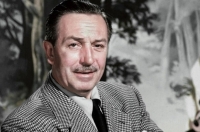
Walter Elias Disney (/ˈdɪzni/; December 5, 1901 – December 15, 1966) was an American entrepreneur, animator, voice actor and film producer. A pioneer of the American animation industry, he introduced several developments in the production of cartoons. As a film producer, Disney holds the record for most Academy Awards earned by an individual, having won 22 Oscars from 59 nominations. He was presented with two Golden Globe Special Achievement Awards and an Emmy Award, among other honors. Several of his films are included in the National Film Registry by the Library of Congress.
Elton John

Sir Elton Hercules John CBE (born Reginald Kenneth Dwight on 25 March 1947) is an English pop/rock singer, composer and pianist.
In his four-decade career, John has been one of the dominant forces in rock and popular music, especially during the 1970s. He has sold over 200 million records, making him one of the most successful artists of all time. He has more than 50 Top 40 hits including seven consecutive No. 1 U.S. albums, 59 Top 40 singles, 16 Top 10, four No. 2 hits, and nine No. 1 hits. He has won five Grammy awards and one Academy Award. His success has had a profound impact on popular music and has contributed to the continued popularity of the piano in rock and roll. In 2004, Rolling Stone ranked him #49 on their list of the 100 greatest artists of all time.
Some of the characteristics of John's musical talent include an ability to quickly craft melodies for the lyrics of songwriting partner Bernie Taupin, his former rich tenor (now baritone) voice, his classical and gospel-influenced piano, the aggressive orchestral arrangements of Paul Buckmaster among others and the flamboyant fashions, outlandishly excessive eyeglasses, and on-stage showmanship, especially evident during the 1970s.
John was inducted into the Rock and Roll Hall of Fame in 1994. He has been heavily involved in the fight against AIDS since the late 1980s, and was knighted in 1998. He entered into a civil partnership with David Furnish on 21 December 2005 and continues to be a champion for LGBT social movements. On April 9, 2008, John held a benefit concert for Hillary Clinton's presidential campaign, raising $2.5 million.
In his four-decade career, John has been one of the dominant forces in rock and popular music, especially during the 1970s. He has sold over 200 million records, making him one of the most successful artists of all time. He has more than 50 Top 40 hits including seven consecutive No. 1 U.S. albums, 59 Top 40 singles, 16 Top 10, four No. 2 hits, and nine No. 1 hits. He has won five Grammy awards and one Academy Award. His success has had a profound impact on popular music and has contributed to the continued popularity of the piano in rock and roll. In 2004, Rolling Stone ranked him #49 on their list of the 100 greatest artists of all time.
Some of the characteristics of John's musical talent include an ability to quickly craft melodies for the lyrics of songwriting partner Bernie Taupin, his former rich tenor (now baritone) voice, his classical and gospel-influenced piano, the aggressive orchestral arrangements of Paul Buckmaster among others and the flamboyant fashions, outlandishly excessive eyeglasses, and on-stage showmanship, especially evident during the 1970s.
John was inducted into the Rock and Roll Hall of Fame in 1994. He has been heavily involved in the fight against AIDS since the late 1980s, and was knighted in 1998. He entered into a civil partnership with David Furnish on 21 December 2005 and continues to be a champion for LGBT social movements. On April 9, 2008, John held a benefit concert for Hillary Clinton's presidential campaign, raising $2.5 million.
Joe Hisaishi

Mamoru Fujisawa (藤澤 守 Fujisawa Mamoru?), known professionally as Joe Hisaishi (久石 譲 Hisaishi Jō?, born December 6, 1950), is a composer and director known for over 100 film scores and solo albums dating back to 1981.
While possessing a stylistically distinct sound, Hisaishi's music has been known to explore and incorporate different genres, including minimalist, experimental electronic, European classical, and Japanese classical. Lesser known are the other musical roles he plays; he is also a typesetter, author, arranger, and head of an orchestra.
He is best known for his work with animator Hayao Miyazaki, having composed scores for many of his films including Nausicaä of the Valley of the Wind (1984), My Neighbor Totoro (1988), Princess Mononoke (1997), Spirited Away (2001), Howl's Moving Castle (2004) and Ponyo (2008). He is also recognized for the soundtracks he has provided for filmmaker 'Beat' Takeshi Kitano, including Dolls (2002), Kikujiro (1999), Hana-bi (1997), Kids Return (1996), Sonatine (1993).
While possessing a stylistically distinct sound, Hisaishi's music has been known to explore and incorporate different genres, including minimalist, experimental electronic, European classical, and Japanese classical. Lesser known are the other musical roles he plays; he is also a typesetter, author, arranger, and head of an orchestra.
He is best known for his work with animator Hayao Miyazaki, having composed scores for many of his films including Nausicaä of the Valley of the Wind (1984), My Neighbor Totoro (1988), Princess Mononoke (1997), Spirited Away (2001), Howl's Moving Castle (2004) and Ponyo (2008). He is also recognized for the soundtracks he has provided for filmmaker 'Beat' Takeshi Kitano, including Dolls (2002), Kikujiro (1999), Hana-bi (1997), Kids Return (1996), Sonatine (1993).
Nobuo Uematsu

Nobuo Uematsu (植松伸夫 Uematsu Nobuo?, born March 21, 1959) is a Japanese video game composer and musician, best known for scoring the majority of titles in the Final Fantasy series. He is regarded as one of the most famous and respected composers in the video game community. Uematsu is a self-taught musician; he began to play the piano at the age of eleven or twelve, with Elton John as his biggest influence.
Uematsu joined Square (later Square Enix) in 1985, where he met Final Fantasy creator Hironobu Sakaguchi. They have worked together on numerous titles, most notably the games in the Final Fantasy series. After nearly 20 years in the company, he left Square Enix in 2004 and founded his own company called Smile Please, as well as the music production company Dog Ear Records. He has since composed music as a freelancer for video games primarily developed by Square Enix and Sakaguchi's development studio Mistwalker.
A handful of soundtracks and arranged albums of Uematsu's game scores have been released. Pieces from his video game works have been performed in concerts worldwide, and numerous Final Fantasy concerts have also been held. He has worked with Grammy Award-winning conductor Arnie Roth on several of these concerts. In 2002, he formed a rock band with colleagues Kenichiro Fukui and Tsuyoshi Sekito called The Black Mages, in which Uematsu plays the keyboard. The band plays arranged rock versions of Uematsu's Final Fantasy compositions.
Uematsu joined Square (later Square Enix) in 1985, where he met Final Fantasy creator Hironobu Sakaguchi. They have worked together on numerous titles, most notably the games in the Final Fantasy series. After nearly 20 years in the company, he left Square Enix in 2004 and founded his own company called Smile Please, as well as the music production company Dog Ear Records. He has since composed music as a freelancer for video games primarily developed by Square Enix and Sakaguchi's development studio Mistwalker.
A handful of soundtracks and arranged albums of Uematsu's game scores have been released. Pieces from his video game works have been performed in concerts worldwide, and numerous Final Fantasy concerts have also been held. He has worked with Grammy Award-winning conductor Arnie Roth on several of these concerts. In 2002, he formed a rock band with colleagues Kenichiro Fukui and Tsuyoshi Sekito called The Black Mages, in which Uematsu plays the keyboard. The band plays arranged rock versions of Uematsu's Final Fantasy compositions.
Devil May Cry
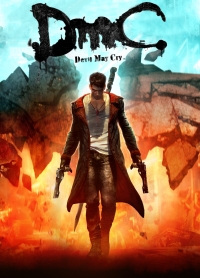
Devil May Cry is a hack-and-slash action-adventure video game series developed and published by Capcom and created by Hideki Kamiya. The series centers on the demon hunter Dante and his efforts to thwart various demon invasions of Earth.
Taio Cruz

Jacob Taio Cruz is a British singer, songwriter and record producer from London, England, currently based in Los Angeles. In 2008, he released his debut album Departure, which he wrote, arranged and produced.
Alfred Schnittke

Alfred Garrievich Schnittke was a Soviet and German composer. Schnittke's early music shows the strong influence of Dmitri Shostakovich. He developed a polystylistic technique in works such as the epic Symphony No. 1 and his first concerto grosso. Wikipedia Born: November 24, 1934, Engels, Russia Died: August 3, 1998, Hamburg, Germany
Place of burial: Novodevichy Cemetery, Moscow, Russia Spouse: Irina Schnittke (m. 1961–1998), Galina Koltsina (m. 1956–1958)
Place of burial: Novodevichy Cemetery, Moscow, Russia Spouse: Irina Schnittke (m. 1961–1998), Galina Koltsina (m. 1956–1958)
Scarlatti
Giuseppe Domenico Scarlatti was an Italian composer. He is classified primarily as a Baroque composer chronologically, although his music was influential in the development of the Classical style and he was one of the few Baroque composers to transition into the classical period.
Gloria Gaynor

Gloria Gaynor (born Gloria Fowles September 7, 1949) is an American singer, best-known for the disco era hits "I Will Survive" (Hot 100 #1, 1979), "Never Can Say Goodbye" (Hot 100 #9, 1974), "Let Me Know (I Have A Right)" (Hot 100 #42, 1980) and "I Am What I Am" (Hot 100 #82, 1983). She was born in Newark, New Jersey.
Gloria began to revive her career worldwide with the aggressive revival of disco beginning in the early to mid 1990's. During the late 1990s, she dabbled in acting for a while, guest starring on The Wayans Bros, That '70s Show, and Ally McBeal before doing a limited engagement performance in Broadway's Smokey Joe's Cafe.
After almost 30 years of its release, Gaynor continues to ride the success of "I Will Survive", touring the country and the world over and performing her signature song on dozens of TV shows.
Gloria began to revive her career worldwide with the aggressive revival of disco beginning in the early to mid 1990's. During the late 1990s, she dabbled in acting for a while, guest starring on The Wayans Bros, That '70s Show, and Ally McBeal before doing a limited engagement performance in Broadway's Smokey Joe's Cafe.
After almost 30 years of its release, Gaynor continues to ride the success of "I Will Survive", touring the country and the world over and performing her signature song on dozens of TV shows.
John Denver
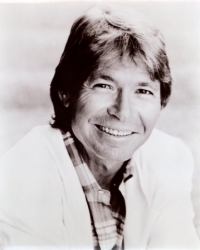
John Denver (December 31, 1943 – October 12, 1997), born Henry John Deutschendorf, Jr., was an American Country Music/folk singer-songwriter and folk rock musician. One of the most popular artists of the 1970s, he recorded and released some 300 songs, about half composed by himself. He was named Poet Laureate of Colorado in 1977. Songs such as "Leaving on a Jet Plane" (1967), "Take Me Home, Country Roads" (1971), "Rocky Mountain High" (1973), "Thank God I'm a Country Boy" (1974), "Annie's Song" (1974), "Sunshine on My Shoulders" (1974), and "Calypso" (1975) are popular worldwide. Denver has been referred to as "The Poet for the Planet", "Mother Nature's Son" (based on The Beatles song he covered) and "A Song's Best Friend".
Schumann

Robert Schumann, sometimes given as Robert Alexander Schumann, (June 8, 1810 – July 29, 1856) was a German composer, aesthete and influential music critic. He is one of the most famous Romantic composers of the 19th century.
He had hoped to pursue a career as a virtuoso pianist, having been assured by his teacher Friedrich Wieck that he could become the finest pianist in Europe after only a few years of study with him. However, a hand injury prevented those hopes from being realized, and he decided to focus his musical energies on composition. Schumann's published compositions were, until 1840, all for the piano; he later composed works for piano and orchestra, many lieder (songs for voice and piano), four symphonies, an opera, and other orchestral, choral and chamber works. His writings about music appeared mostly in the Neue Zeitschrift für Musik ("The New Journal for Music"), a Leipzig-based publication that he jointly founded.
In 1840, after a long and acrimonious legal battle with his piano instructor Friedrich Wieck, Schumann married Wieck's daughter, pianist Clara Wieck, a considerable figure of the Romantic period in her own right. Clara Wieck showcased many works by her husband as well. For the last two years of his life, after an attempted suicide, Schumann was confined to a mental institution.
He had hoped to pursue a career as a virtuoso pianist, having been assured by his teacher Friedrich Wieck that he could become the finest pianist in Europe after only a few years of study with him. However, a hand injury prevented those hopes from being realized, and he decided to focus his musical energies on composition. Schumann's published compositions were, until 1840, all for the piano; he later composed works for piano and orchestra, many lieder (songs for voice and piano), four symphonies, an opera, and other orchestral, choral and chamber works. His writings about music appeared mostly in the Neue Zeitschrift für Musik ("The New Journal for Music"), a Leipzig-based publication that he jointly founded.
In 1840, after a long and acrimonious legal battle with his piano instructor Friedrich Wieck, Schumann married Wieck's daughter, pianist Clara Wieck, a considerable figure of the Romantic period in her own right. Clara Wieck showcased many works by her husband as well. For the last two years of his life, after an attempted suicide, Schumann was confined to a mental institution.
Evanescence

Evanescence is an American rock band founded in Little Rock, Arkansas in 1995 by singer/pianist Amy Lee and guitarist Ben Moody.
After recording two private EPs and a demo CD named Origin, with the help of Bigwig Enterprises in 2000, the band released their first full-length album, Fallen, on Wind-up Records in 2003. Fallen sold more than 15 million copies worldwide and helped the band win two Grammy Awards. A year later, Evanescence released their first live album, Anywhere but Home, which sold more than one million copies worldwide. In 2006, the band released their second studio album, The Open Door, which has sold more than four million copies.
The band has suffered several line-up changes, including co-founder Moody leaving in 2003, followed by guitarist John LeCompt and drummer Rocky Gray in 2007. Lee is now the only original member of Evanescence remaining in the band.
After recording two private EPs and a demo CD named Origin, with the help of Bigwig Enterprises in 2000, the band released their first full-length album, Fallen, on Wind-up Records in 2003. Fallen sold more than 15 million copies worldwide and helped the band win two Grammy Awards. A year later, Evanescence released their first live album, Anywhere but Home, which sold more than one million copies worldwide. In 2006, the band released their second studio album, The Open Door, which has sold more than four million copies.
The band has suffered several line-up changes, including co-founder Moody leaving in 2003, followed by guitarist John LeCompt and drummer Rocky Gray in 2007. Lee is now the only original member of Evanescence remaining in the band.
Charles-Valentin Alkan
Charles-Valentin Alkan (French: ; 30 November 1813 – 29 March 1888) was a French-Jewish composer and virtuoso pianist. At the height of his fame in the 1830s and 1840s he was, alongside his friends and colleagues Frédéric Chopin and Franz Liszt, among the leading pianists in Paris, a city in which he spent virtually his entire life.Alkan earned many awards at the Conservatoire de Paris, which he entered before he was six. His career in the salons and concert halls of Paris was marked by his occasional long withdrawals from public performance, for personal reasons. Although he had a wide circle of friends and acquaintances in the Parisian artistic world, including Eugène Delacroix and George Sand, from 1848 he began to adopt a reclusive life style, while continuing with his compositions – virtually all of which are for the keyboard.
Rachmaninoff

Sergei Vasilievich Rachmaninoff (1 April 1873 - 28 March 1943) was a Russian composer, pianist, and conductor. He was one of the finest pianists of his day and, as a composer, the last great representative of Russian late Romanticism in classical music. Early influences of Tchaikovsky, Rimsky-Korsakov and other Russian composers gave way to a thoroughly personal idiom which included a pronounced lyricism, expressive breadth, structural ingenuity and a tonal palette of rich, distinctive orchestral colors.
Understandably, the piano figures prominently in Rachmaninoff's compositional output, either as a solo instrument or as part of an ensemble. He made it a point, however, to use his own skills as a performer to explore fully the expressive possibilities of the instrument. Even in his earliest works, he revealed a sure grasp of idiomatic piano writing and a striking gift for melody. In some of his early orchestral pieces he showed the first signs of a talent for tone painting, which he would perfect in The Isle of the Dead, and he began to show a similar penchant for vocal writing in two early sets of songs, Opp. 4 and 8. Rachmaninoff's masterpiece, however, is his choral symphony The Bells, in which all of his talents are fused and unified.
Rachmaninoff sometimes felt threatened by the success of modernists such as Scriabin and Prokofiev and wondered whether to cease composing even before he left Russia. His musical philosophy was rooted in the Russian spiritual tradition, where the role of the artist was to create beauty and to speak the truth from the depths of his heart. In his last major interview, in 1941, he admitted his music, like Russian music, was a product of his temperament. He said, on another occasion, "The new kind of music seems to create not from the heart but from the head. Its composers think rather than feel. They have not the capacity to make their works exalt—they meditate, protest, analyze, reason, calculate and brood, but they do not exalt."
Understandably, the piano figures prominently in Rachmaninoff's compositional output, either as a solo instrument or as part of an ensemble. He made it a point, however, to use his own skills as a performer to explore fully the expressive possibilities of the instrument. Even in his earliest works, he revealed a sure grasp of idiomatic piano writing and a striking gift for melody. In some of his early orchestral pieces he showed the first signs of a talent for tone painting, which he would perfect in The Isle of the Dead, and he began to show a similar penchant for vocal writing in two early sets of songs, Opp. 4 and 8. Rachmaninoff's masterpiece, however, is his choral symphony The Bells, in which all of his talents are fused and unified.
Rachmaninoff sometimes felt threatened by the success of modernists such as Scriabin and Prokofiev and wondered whether to cease composing even before he left Russia. His musical philosophy was rooted in the Russian spiritual tradition, where the role of the artist was to create beauty and to speak the truth from the depths of his heart. In his last major interview, in 1941, he admitted his music, like Russian music, was a product of his temperament. He said, on another occasion, "The new kind of music seems to create not from the heart but from the head. Its composers think rather than feel. They have not the capacity to make their works exalt—they meditate, protest, analyze, reason, calculate and brood, but they do not exalt."
Traditional

Regina Spektor

Regina Spektor (born February 18, 1980) is a Soviet-born Jewish-American singer-songwriter and pianist. Her music is associated with the anti-folk scene centered on New York City's East Village.
Spektor has said that she has created 700 songs, but that she rarely writes any of them down. She has also stated that she never aspired to write songs herself, but songs seem to just flow to her. Spektor possesses a broad vocal range and uses the full extent of it. She also explores a variety of different and somewhat unorthodox vocal techniques, such as verses composed entirely of buzzing noises made with the lips and beatbox-style flourishes in the middle of ballads, and also makes use of such unusual musical techniques as using a drum stick to tap rhythms on the body of the piano or chair.
Her lyrics are equally eclectic, often taking the form of abstract narratives or first-person character studies, similar to short stories or vignettes put to song. Spektor usually sings in English, though she sometimes includes a few words or verses of Latin, Russian, French, and other languages in her songs.
Spektor has said that she has created 700 songs, but that she rarely writes any of them down. She has also stated that she never aspired to write songs herself, but songs seem to just flow to her. Spektor possesses a broad vocal range and uses the full extent of it. She also explores a variety of different and somewhat unorthodox vocal techniques, such as verses composed entirely of buzzing noises made with the lips and beatbox-style flourishes in the middle of ballads, and also makes use of such unusual musical techniques as using a drum stick to tap rhythms on the body of the piano or chair.
Her lyrics are equally eclectic, often taking the form of abstract narratives or first-person character studies, similar to short stories or vignettes put to song. Spektor usually sings in English, though she sometimes includes a few words or verses of Latin, Russian, French, and other languages in her songs.
Claude-Michel Schonberg
Claude-Michel Schönberg is a French record producer, actor, singer, songwriter, and musical theatre composer, best known for his collaborations with lyricist Alain Boublil. Major works include La Révolution Française, Les Misérables, Miss Saigon, Martin Guerre, The Pirate Queen, and Marguerite.
Rossini

Gioachino Antonio Rossini (February 29, 1792 – November 13, 1868) was a popular Italian composer who created 39 operas as well as sacred music and chamber music. His best known works include Il barbiere di Siviglia (The Barber of Seville), La Cenerentola and Guillaume Tell (William Tell).
Rossini's most famous opera was produced on February 20, 1816 at the Teatro Argentina in Rome. The libretto by Cesare Sterbini, a version of Pierre Beaumarchais' infamous stage play Le Barbier de Séville, was the same as that already used by Giovanni Paisiello in his own Barbiere, an opera which had enjoyed European popularity for more than a quarter of a century. Much is made of how fast Rossini's opera was written, scholarship generally agreeing upon two weeks. Later in life, Rossini claimed to have written the opera in only twelve days. It was a colossal failure when it premiered as Almaviva; Paisiello’s admirers were extremely indignant, sabotaging the production by whistling and shouting during the entire first act. However, not long after the second performance, the opera became so successful that the fame of Paisiello's opera was transferred to Rossini's, to which the title The Barber of Seville passed as an inalienable heritage.
Rossini's most famous opera was produced on February 20, 1816 at the Teatro Argentina in Rome. The libretto by Cesare Sterbini, a version of Pierre Beaumarchais' infamous stage play Le Barbier de Séville, was the same as that already used by Giovanni Paisiello in his own Barbiere, an opera which had enjoyed European popularity for more than a quarter of a century. Much is made of how fast Rossini's opera was written, scholarship generally agreeing upon two weeks. Later in life, Rossini claimed to have written the opera in only twelve days. It was a colossal failure when it premiered as Almaviva; Paisiello’s admirers were extremely indignant, sabotaging the production by whistling and shouting during the entire first act. However, not long after the second performance, the opera became so successful that the fame of Paisiello's opera was transferred to Rossini's, to which the title The Barber of Seville passed as an inalienable heritage.
Anastasia

Anastasia is an Academy Award nominated American animated feature musical film produced and directed by Don Bluth and Gary Goldman at Fox Animation Studios, and was released on November 14, 1997 by 20th Century Fox.
The idea for the film originates from Fox's 1956 live-action film version of the same name. Executives at Fox gave Bluth and Goldman the choice of creating an animated adaptation of either the 1956 film or the original play by Marcelle Maurette.
The idea for the film originates from Fox's 1956 live-action film version of the same name. Executives at Fox gave Bluth and Goldman the choice of creating an animated adaptation of either the 1956 film or the original play by Marcelle Maurette.
Szymanowski
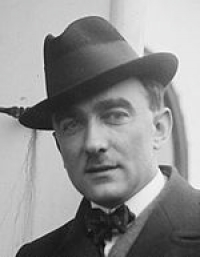
Karol Maciej Szymanowski (3 October 1882 – 28 March 1937) was a Polish composer and pianist.
Among Szymanowski's better known orchestral works are four symphonies (No. 3, Song of the Night with choir and vocal soloists and No. 4, Symphonie Concertante, with piano concertante) and two dream-like violin concertos. His stage works include the ballets Harnasie and Mandragora and the operas Hagith and Król Roger ('King Roger'). He wrote much piano music, including the four Etudes, Op. 4 (of which No. 3 may be his single most popular piece), many mazurkas and the exquisite and highly individual Metopes. Other works include the Three Myths for violin and piano, two masterful string quartets, a sonata for violin and piano, a number of orchestral songs (some to texts by Hafez and James Joyce) and his Stabat Mater, an acknowledged choral masterpiece.
According to Samson (p. 131), "Szymanowski adopted no thorough-going alternatives to tonal organization the harmonic tensions and relaxations and the melodic phraseology have clear origins in tonal procedure, but an underpinning tonal framework has been almost or completely dissolved away."
Among Szymanowski's better known orchestral works are four symphonies (No. 3, Song of the Night with choir and vocal soloists and No. 4, Symphonie Concertante, with piano concertante) and two dream-like violin concertos. His stage works include the ballets Harnasie and Mandragora and the operas Hagith and Król Roger ('King Roger'). He wrote much piano music, including the four Etudes, Op. 4 (of which No. 3 may be his single most popular piece), many mazurkas and the exquisite and highly individual Metopes. Other works include the Three Myths for violin and piano, two masterful string quartets, a sonata for violin and piano, a number of orchestral songs (some to texts by Hafez and James Joyce) and his Stabat Mater, an acknowledged choral masterpiece.
According to Samson (p. 131), "Szymanowski adopted no thorough-going alternatives to tonal organization the harmonic tensions and relaxations and the melodic phraseology have clear origins in tonal procedure, but an underpinning tonal framework has been almost or completely dissolved away."
Mark Hayes
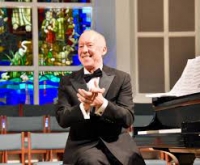
Mark Hayes is an American composer and arranger. His predominant output is of choral music in the Christian sacred music and gospel music genres.
Sylvano Bussotti
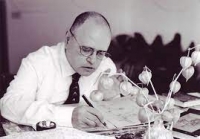
Sylvano Bussotti was an Italian composer of contemporary classical music, also a painter, set and costume designer, opera director and manager, writer and academic teacher. His compositions employ graphic notation, which has often created special problems of interpretation. He was known as a composer for the stage.
C. B. Hawley
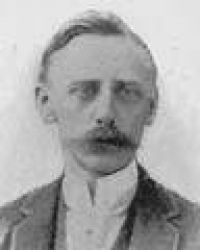
Charles Beach Hawley (Brookfield, Connecticut, February 14, 1858 – Eatontown, New Jersey, December 29, 1915) was an American bass, voice teacher, organist and composer of art songs and other vocal works. Charles Beach was born to John N. and Clarissa W. Keeler Hawley in Brookfield, Connecticut. Charles and his father were descendants of the pioneer founders of Newtown, which later became part of Brookfield. For many years, his father was the organist at St. Paul's Church in Brookfield.
Yan Jue
Yen-j (Chinese:嚴爵; Jyutping: jim4 zoek3; Pe̍h-ōe-jī: Giâm Chiok; Pha̍k-fa-sṳ: Nyâm Tsiok; born 23 April 1988) is a Taiwanese jazz-pop singer-songwriter and actor. He has achieved rising success as a newcomer on the Mandopop scene, due to testimonials from well-known artists such as Wang Leehom, Mayday's Ashin, Dee Hsu, Blackie Chen and DJ Xiao Shu. His fresh combinations of jazz and pop have made him a noticeable star on the rise. His debut album, Thanks to Your Greatness (谢谢你的美好) contains 11 songs, all written, and produced by him, or with his input. He also plays many instruments, such as the piano, trombone, guitar and bass guitar.
John Williams

John Towner Williams (born February 8, 1932) is an American composer, conductor, and pianist. In a career that spans six decades, Williams has composed many of the most famous film scores in Hollywood history, including Star Wars, Superman, Home Alone, the first three Harry Potter movies and all but two of Steven Spielberg's feature films including the Indiana Jones series, Schindler's List, E.T. the Extra-Terrestrial, Jurassic Park and Jaws. He also composed the soundtrack for the hit 1960s television series Lost in Space as well as the fanfare of the DreamWorks Pictures' logo.
Williams has composed theme music for four Olympic Games, the NBC Nightly News, the rededication of the Statue of Liberty, and numerous television series and concert pieces. He served as the principal conductor of the Boston Pops Orchestra from 1980 to 1993, and is now the orchestra's laureate conductor.
Williams is a five-time winner of the Academy Award. He has also won four Golden Globe Awards, seven BAFTA Awards and 21 Grammy Awards. With 45 Academy Award nominations, Williams is, together with composer Alfred Newman, the second most nominated person after Walt Disney. He was inducted into the Hollywood Bowl Hall of Fame in 2000, and was a recipient of the Kennedy Center Honors in 2004.
Williams has composed theme music for four Olympic Games, the NBC Nightly News, the rededication of the Statue of Liberty, and numerous television series and concert pieces. He served as the principal conductor of the Boston Pops Orchestra from 1980 to 1993, and is now the orchestra's laureate conductor.
Williams is a five-time winner of the Academy Award. He has also won four Golden Globe Awards, seven BAFTA Awards and 21 Grammy Awards. With 45 Academy Award nominations, Williams is, together with composer Alfred Newman, the second most nominated person after Walt Disney. He was inducted into the Hollywood Bowl Hall of Fame in 2000, and was a recipient of the Kennedy Center Honors in 2004.
John Coltrane

John William "Trane" Coltrane (September 23, 1926 – July 17, 1967) was an American jazz saxophonist and composer.
Working in the bebop and hard bop idioms early in his career, Coltrane helped pioneer the use of modes in jazz and later was at the forefront of free jazz. He was prolific, making about fifty recordings as a leader during his recording career, and appeared as a sideman on many other albums, notably with trumpeter Miles Davis and pianist Thelonious Monk. As his career progressed, Coltrane's music took on an increasingly spiritual dimension. His second wife was pianist Alice Coltrane, and their son Ravi Coltrane is also a saxophonist.
He influenced innumerable musicians, and remains one of the most significant tenor saxophonists in jazz history. He received many awards, among them a posthumous Special Citation from the Pulitzer Prize Board in 2007 for his "masterful improvisation, supreme musicianship and iconic centrality to the history of jazz."
Working in the bebop and hard bop idioms early in his career, Coltrane helped pioneer the use of modes in jazz and later was at the forefront of free jazz. He was prolific, making about fifty recordings as a leader during his recording career, and appeared as a sideman on many other albums, notably with trumpeter Miles Davis and pianist Thelonious Monk. As his career progressed, Coltrane's music took on an increasingly spiritual dimension. His second wife was pianist Alice Coltrane, and their son Ravi Coltrane is also a saxophonist.
He influenced innumerable musicians, and remains one of the most significant tenor saxophonists in jazz history. He received many awards, among them a posthumous Special Citation from the Pulitzer Prize Board in 2007 for his "masterful improvisation, supreme musicianship and iconic centrality to the history of jazz."
Bela Bartok

Béla Viktor János Bartók (pronounced /ˈbɑrtɒk/ (Wells 1990), Hungarian pronunciation: ) (March 25, 1881 – September 26, 1945) was a Hungarian composer and pianist. He is considered to be one of the greatest composers of the 20th century and is regarded, along with Liszt, as his country's greatest composer (Gillies 2001). Through his collection and analytical study of folk music, he was one of the founders of ethnomusicology.
Yoko Kanno

Yoko Kanno (菅野 よう子 Kanno Yōko?, born March 19, 1964 in Miyagi Prefecture, Japan) is a composer, arranger and musician best known for her work on the soundtracks for many games, anime films, TV series, live-action movies, and advertisements. She has written scores for famous animated works, including Macross Plus, Turn A Gundam, Cowboy Bebop, The Vision of Escaflowne, Ghost in the Shell: Stand Alone Complex, Wolf's Rain, and is the most trusted composer by veteran and new-wave directors such as Yoshiyuki Tomino, Shinichiro Watanabe and Shoji Kawamori. Kanno has also composed music for J-pop artists, the most notable being Maaya Sakamoto and Kyōko Koizumi. She is also a skilled keyboardist, and is the frontwoman for The Seatbelts, who perform many of Kanno's compositions on the various original soundtracks for which she is responsible.
Leos Janacek
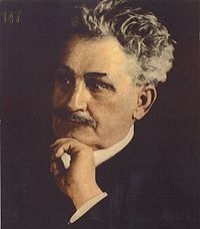
Leoš Janáček (Czech pronunciation: ( listen)) (baptised Leo Eugen Janáček) (July 3, 1854 – August 12, 1928), was a Czech composer, musical theorist, folklorist, publicist and teacher. He was inspired by Moravian and all Slavic folk music to create an original, modern musical style. Until 1895 he devoted himself mainly to folkloristic research and his early musical output was influenced by contemporaries such as Antonín Dvořák. His later, mature works incorporate his earlier studies of national folk music in a modern, highly original synthesis, first evident in the opera Jenůfa, which was premiered in 1904 in Brno. The success of Jenůfa (often called the "Moravian national opera") at Prague in 1916 gave Janáček access to the world's great opera stages. Janáček's later works are his most celebrated. They include the symphonic poem Sinfonietta, the oratorial Glagolitic Mass, the rhapsody Taras Bulba, string quartets, other chamber works and operas. He is considered to rank with Antonín Dvořák and Bedřich Smetana, as one of the most important Czech composers.
Pierre-Alexandre Monsigny
ierre-Alexandre Monsigny (17 October 1729 – 14 January 1817) was a French composer and a member of the French Académie des Beaux-Arts (1813).He is considered alongside André Grétry and François-André Danican Philidor to have been the founder of a new musical genre, the opéra comique, laying a path for other French composers such as François-Adrien Boieldieu, Daniel-François-Esprit Auber, Charles Gounod, Georges Bizet, and Jules Massenet in this genre.
Paul Dukas is quoted as saying, "Of all the composers of our country, he may be the first who had the gift of true, human emotion, of communicative expression and of fair feeling".
Paul Dukas is quoted as saying, "Of all the composers of our country, he may be the first who had the gift of true, human emotion, of communicative expression and of fair feeling".
Jane Eyre
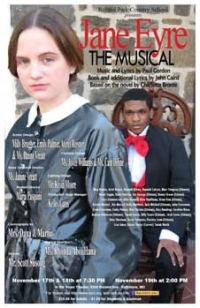
Jane Eyre is a musical drama with music by composer-lyricist Paul Gordon and a book by John Caird, based on the novel by Charlotte Brontë.
The premiere of the musical took place in Wichita, Kansas in the autumn of 1995. Minor roles and the large ensemble of schoolgirls for the scenes at Brocklehurst's school were cast locally, while the directors brought several members of the principal cast from New York. The musical was well received, and a recording of this rendition allowed the creative team and their backers to slowly move the project towards an opening on Broadway.
The musical debuted at the Brooks Atkinson Theatre on November 9, 2000, with an official opening on December 10, 2000. It enjoyed 36 previews and 209 regular performances before closing on June 10, 2001. Marla Schaffel, who played the title character, won a Drama Desk Award for her performance. The production was directed by John Caird and Scott Schwartz, with choreography by Jayne Paterson.
A revised version is currently in the works, with an expected regional debut in the 2008 or 2009 season.
The premiere of the musical took place in Wichita, Kansas in the autumn of 1995. Minor roles and the large ensemble of schoolgirls for the scenes at Brocklehurst's school were cast locally, while the directors brought several members of the principal cast from New York. The musical was well received, and a recording of this rendition allowed the creative team and their backers to slowly move the project towards an opening on Broadway.
The musical debuted at the Brooks Atkinson Theatre on November 9, 2000, with an official opening on December 10, 2000. It enjoyed 36 previews and 209 regular performances before closing on June 10, 2001. Marla Schaffel, who played the title character, won a Drama Desk Award for her performance. The production was directed by John Caird and Scott Schwartz, with choreography by Jayne Paterson.
A revised version is currently in the works, with an expected regional debut in the 2008 or 2009 season.
Paul Hindemith
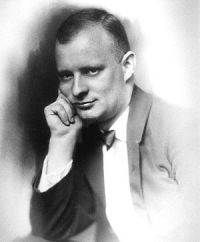
Paul Hindemith (16 November 1895 – 28 December 1963) was a German composer, violist, violinist, teacher, music theorist and conductor.
The Rolling Stones
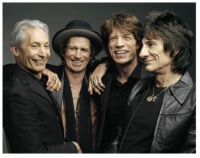
The Rolling Stones are an English band whose music was initially based on rhythm and blues and rock and roll. Formed in London and having their first success in the UK, they subsequently became popular in the US during the "British Invasion" in the early 1960s.
The band formed in 1962 when original leader Brian Jones and pianist Ian Stewart were joined by singer Mick Jagger as lead vocals and guitarist Keith Richards, whose songwriting partnership later contributed to their taking the leadership role in the group. Bassist Bill Wyman and drummer Charlie Watts completed the early lineup. Ian Stewart was removed from the official lineup in 1963 but continued to work with the band as road manager and keyboardist until his death in 1985.
The band's early recordings were mainly covers of American blues and R&B songs. Their 1965 single "(I Can't Get No) Satisfaction" established The Rolling Stones as a premier rock and roll act. Starting with their 1966 album Aftermath, the songs of Jagger and Richards, aided by the instrumental experimentation of Jones, expanded an always present stylistic flexibility. Jones died in 1969 shortly after being fired from the band and was replaced by Mick Taylor. Taylor recorded five albums with The Rolling Stones before quitting in 1974. Former Faces guitarist Ronnie Wood stepped in and has been with the band ever since. Wyman left the Rolling Stones in 1993; bassist Darryl Jones, who is not an official band member, has worked with the group since 1994.
The Rolling Stones have released 22 studio albums in the UK (24 in the US), eight concert albums (nine in the US) and numerous compilations; they have had 32 UK & US top-10 singles, 43 UK & US top-10 albums from 1964 and 2008 and have sold more than 200 million albums worldwide. 1971's Sticky Fingers began a string of eight consecutive studio albums at number one in the United States. In 1989 The Rolling Stones were inducted into the American Rock and Roll Hall of Fame, and in 2004 they were ranked number 4 in Rolling Stone magazine's 100 Greatest Artists of All Time. They are also ranked as the number 2 artists of all time on Acclaimedmusic.net. Their latest studio album, A Bigger Bang, was released in 2005 and followed by the highest-grossing tour in history, which lasted into late summer 2007. During the 1969 American tour, tour manager Sam Cutler introduced them as "The Greatest Rock and Roll Band in the World". Their image of unkempt and surly youth is one that many musicians still emulate.
The band formed in 1962 when original leader Brian Jones and pianist Ian Stewart were joined by singer Mick Jagger as lead vocals and guitarist Keith Richards, whose songwriting partnership later contributed to their taking the leadership role in the group. Bassist Bill Wyman and drummer Charlie Watts completed the early lineup. Ian Stewart was removed from the official lineup in 1963 but continued to work with the band as road manager and keyboardist until his death in 1985.
The band's early recordings were mainly covers of American blues and R&B songs. Their 1965 single "(I Can't Get No) Satisfaction" established The Rolling Stones as a premier rock and roll act. Starting with their 1966 album Aftermath, the songs of Jagger and Richards, aided by the instrumental experimentation of Jones, expanded an always present stylistic flexibility. Jones died in 1969 shortly after being fired from the band and was replaced by Mick Taylor. Taylor recorded five albums with The Rolling Stones before quitting in 1974. Former Faces guitarist Ronnie Wood stepped in and has been with the band ever since. Wyman left the Rolling Stones in 1993; bassist Darryl Jones, who is not an official band member, has worked with the group since 1994.
The Rolling Stones have released 22 studio albums in the UK (24 in the US), eight concert albums (nine in the US) and numerous compilations; they have had 32 UK & US top-10 singles, 43 UK & US top-10 albums from 1964 and 2008 and have sold more than 200 million albums worldwide. 1971's Sticky Fingers began a string of eight consecutive studio albums at number one in the United States. In 1989 The Rolling Stones were inducted into the American Rock and Roll Hall of Fame, and in 2004 they were ranked number 4 in Rolling Stone magazine's 100 Greatest Artists of All Time. They are also ranked as the number 2 artists of all time on Acclaimedmusic.net. Their latest studio album, A Bigger Bang, was released in 2005 and followed by the highest-grossing tour in history, which lasted into late summer 2007. During the 1969 American tour, tour manager Sam Cutler introduced them as "The Greatest Rock and Roll Band in the World". Their image of unkempt and surly youth is one that many musicians still emulate.
The Rasmus

The Rasmus are a Finnish rock band that formed in 1994 in Helsinki while the band members were still in upper comprehensive school. The original band members were Lauri Ylönen (lead singer/songwriter), Eero Heinonen (bass), Pauli Rantasalmi (guitar) and Janne Heiskanen (drums). Heiskanen quit the band in 1998 and was soon replaced by Aki Hakala.
Before releasing their fourth studio album Into (2001), they were simply known as Rasmus, but changed their name to The Rasmus in order to avoid being confused with a Swedish DJ of the same name. They gained international fame with their 2003 album Dead Letters which went gold and platinum in several countries, accompanied with the single "In the Shadows" which reached number 1 in a number of countries. Their follow-up album Hide from the Sun which was released in October 2005 also went platinum in Finland.
The band is one of Finland's most successful with more than 3.5 million sold albums worldwide, eight gold awards and five platinum awards. They have released seven studio albums, one compilation album and 21 singles. Some of the band's most famous songs are the singles "Liquid", "F-F-F-Falling", "In the Shadows", "First Day of My Life", "Funeral Song" , "No Fear", "Sail Away", "Livin' in a World Without You", and "Justify". Their most recent album, titled Black Roses, was released in 2008. Immediately it replaced Metallica's latest album Death Magnetic in the Finnish Album Charts and went gold after one week.
Before releasing their fourth studio album Into (2001), they were simply known as Rasmus, but changed their name to The Rasmus in order to avoid being confused with a Swedish DJ of the same name. They gained international fame with their 2003 album Dead Letters which went gold and platinum in several countries, accompanied with the single "In the Shadows" which reached number 1 in a number of countries. Their follow-up album Hide from the Sun which was released in October 2005 also went platinum in Finland.
The band is one of Finland's most successful with more than 3.5 million sold albums worldwide, eight gold awards and five platinum awards. They have released seven studio albums, one compilation album and 21 singles. Some of the band's most famous songs are the singles "Liquid", "F-F-F-Falling", "In the Shadows", "First Day of My Life", "Funeral Song" , "No Fear", "Sail Away", "Livin' in a World Without You", and "Justify". Their most recent album, titled Black Roses, was released in 2008. Immediately it replaced Metallica's latest album Death Magnetic in the Finnish Album Charts and went gold after one week.
Super Mario Bros

Super Mario is a platform game series created by Nintendo, featuring their mascot, Mario. Alternatively called the Super Mario Bros. series or simply the Mario series, it is the central series of the greater Mario franchise. At least one Super Mario game has been released for every major Nintendo video game console. There have also been a number of Super Mario video games released on non-Nintendo gaming platforms. There are currently twenty-one similar games and one cross-series game that may or may not be included as part of the series.
Emerson, Lake & Palmer
Emerson, Lake & Palmer (ELP) were an English progressive rock supergroup formed in London in April 1970. The band consisted of Keith Emerson (keyboards), Greg Lake (vocals, bass, guitar and producer) and Carl Palmer (drums and percussion). With nine RIAA-certified gold record albums in the US, and an estimated 48 million records sold worldwide, they were one of the most popular and commercially successful progressive rock bands in the 1970s, with a musical sound including adaptations of classical music with jazz and symphonic rock elements, dominated by Emerson's flamboyant use of the Hammond organ, Moog synthesizer, and piano (although Lake wrote several acoustic songs for the group).
Yann Tiersen

Guillaume Yann Tiersen (born 23 June 1970) is a French musician and composer known internationally for composing the score to the Jean-Pierre Jeunet movie Amélie. His music is recognized by its use of a large variety of instruments in relatively minimalist compositions, often with a touch of either European classical music or French folk music, using primarily the piano, accordion or violin together with instruments like the melodica, xylophone, toy piano, ondes martenot, harpsichord and typewriter. His musical style is reminiscent of Frédéric Chopin, Erik Satie, Philip Glass and Michael Nyman.
Anton Arensky
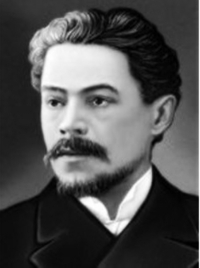
Anton Stepanovich Arensky (Russian: Анто́н Степа́нович Аре́нский; 12 July 1861 – 25 February 1906) was a Russian composer of Romantic classical music, a pianist and a professor of music.Arensky was born in a music-loving, affluent family in Novgorod, Russia. He was musically precocious and had composed a number of songs and piano pieces by the age of nine. With his mother and father, he moved to Saint Petersburg in 1879, after which he studied composition at the Saint Petersburg Conservatory with Nikolai Rimsky-Korsakov.
Elisabeth Musical
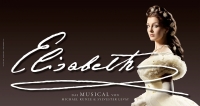
Elisabeth Musical Musical artist Available on Mama, wo bist du? Elisabeth, mach auf mein Engel Der Schleier fällt.
Debussy

Achille-Claude Debussy (August 22, 1862 – March 25, 1918) was a French composer. Along with Maurice Ravel, he is considered one of the most prominent figures working within the field of Impressionist music, though he himself intensely disliked the term when applied to his compositions. Debussy was not only among the most important of all French composers but also was a central figure in all European music at the turn of the twentieth century.
Debussy's music virtually defines the transition from late-Romantic music to twentieth century modernist music. In French literary circles, the style of this period was known as Symbolism, a movement that directly inspired Debussy both as a composer and as an active cultural participant.
Debussy's music virtually defines the transition from late-Romantic music to twentieth century modernist music. In French literary circles, the style of this period was known as Symbolism, a movement that directly inspired Debussy both as a composer and as an active cultural participant.
Bill Withers
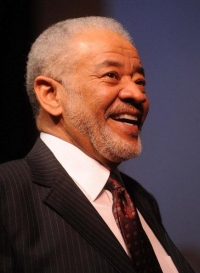
Bill Withers (born July 4, 1938 in Slab Fork, West Virginia) is an American singer-songwriter who performed and recorded from the late 1960s until the mid 1980s. Some of his best-known songs are "Ain't No Sunshine," "Use Me," "Lovely Day," "Lean on Me", "Grandma's Hands" and "Just the Two of Us".
Scott Alan

cott Alan is an American songwriter who has released eight albums, beginning with his debut album Dreaming Wide Awake.[2
Stephen Schwartz
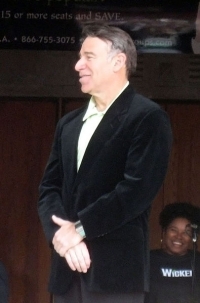
Stephen Lawrence Schwartz (born March 6, 1948) is an American musical theater lyricist and composer. In a career already spanning over four decades, Schwartz has written such hit musicals as Godspell (1971), Pippin (1972) and Wicked (2003). He has also contributed lyrics for a number of successful films, including Pocahontas (1995), The Hunchback of Notre Dame (1996), The Prince of Egypt (1998; music and lyrics) and Enchanted (2007). Schwartz has won the Drama Desk Award for Outstanding Lyrics, three Grammy Awards, and three Academy Awards and has been nominated for six Tony Awards.
Duke Ellington

Edward Kennedy "Duke" Ellington (April 29, 1899 â May 24, 1974) was an American composer, pianist, and bandleader.
Recognized during his life as one of the most influential figures in jazz, if not in all American music, Ellington's reputation has increased since his death, including a special award citation from the Pulitzer Prize Board.
Ellington called his style and sound "American Music" rather than jazz, and liked to describe those who impressed him as "beyond category", including many of the musicians who served with his orchestra, some of whom were themselves considered among the giants of jazz and remained with Ellington's orchestra for decades. While many were noteworthy in their own right, it was Ellington that melded them into one of the most well-known orchestral units in the history of jazz. He often composed specifically for the style and skills of these individuals, such as "Jeep's Blues" for Johnny Hodges, "Concerto for Cootie" ("Do Nothing Till You Hear from Me") for Cootie Williams and "The Mooche" for Tricky Sam Nanton. He also recorded songs written by his bandsmen, such as Juan Tizol's "Caravan" and "Perdido" which brought the "Spanish Tinge" to big-band jazz. After 1941, he frequently collaborated with composer-arranger Billy Strayhorn, who he called his alter-ego.
One of the twentieth century's best-known African-American celebrities, Ellington recorded for many American record companies, and appeared in several films. Ellington and his orchestra toured the United States and Europe regularly before and after World War II. Ellington led his band from 1923 until his death in 1974. His son Mercer Ellington took over the band until his death from cancer in 1996. Paul Ellington, Mercer's youngest son, took over the Orchestra from there and after his mother's passing took over the Estate of Duke and Mercer Ellington.
Recognized during his life as one of the most influential figures in jazz, if not in all American music, Ellington's reputation has increased since his death, including a special award citation from the Pulitzer Prize Board.
Ellington called his style and sound "American Music" rather than jazz, and liked to describe those who impressed him as "beyond category", including many of the musicians who served with his orchestra, some of whom were themselves considered among the giants of jazz and remained with Ellington's orchestra for decades. While many were noteworthy in their own right, it was Ellington that melded them into one of the most well-known orchestral units in the history of jazz. He often composed specifically for the style and skills of these individuals, such as "Jeep's Blues" for Johnny Hodges, "Concerto for Cootie" ("Do Nothing Till You Hear from Me") for Cootie Williams and "The Mooche" for Tricky Sam Nanton. He also recorded songs written by his bandsmen, such as Juan Tizol's "Caravan" and "Perdido" which brought the "Spanish Tinge" to big-band jazz. After 1941, he frequently collaborated with composer-arranger Billy Strayhorn, who he called his alter-ego.
One of the twentieth century's best-known African-American celebrities, Ellington recorded for many American record companies, and appeared in several films. Ellington and his orchestra toured the United States and Europe regularly before and after World War II. Ellington led his band from 1923 until his death in 1974. His son Mercer Ellington took over the band until his death from cancer in 1996. Paul Ellington, Mercer's youngest son, took over the Orchestra from there and after his mother's passing took over the Estate of Duke and Mercer Ellington.
Grzegorz Turnau
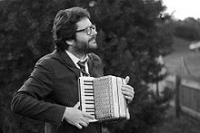
Grzegorz Turnau is a Polish composer, pianist, poet and singer.
He was born on 31 July 1967 in Kraków, Poland. At age seventeen he won First Prize (Grand Prix) at The Student Song Festival in Kraków in 1984. He went on to join the Piwnica pod Baranami Cabaret, composing such hits as "Znów wędrujemy", and released his first album, Naprawdę nie dzieje się nic ("Really, nothing is happening") in 1991. He has released eleven albums to date, including one (Cafe Sułtan) made up of his own versions of songs by Jeremi Przybora and Jerzy Wasowski, and most have enjoyed considerable chart success. His characteristic style consists of strong, clear lyrics and music composed in special keys and harmonies, using instruments such as piano (played by himself), saxophone, violin and various horns. Influenced by such artists as Marek Grechuta and Jan Kanty Pawluśkiewicz, his music style has been described as "soft jazz". He did participate in the Aleksander Glondys's "Ellington po krakowsku" ("Ellington Kraków way"), a concert based upon idea of notable composers of Piwnica pod Baranami playing their interpretations of Duke's music. Other participants include Pawluśkiewicz, Zbigniew Raj and several other musicians.
He was born on 31 July 1967 in Kraków, Poland. At age seventeen he won First Prize (Grand Prix) at The Student Song Festival in Kraków in 1984. He went on to join the Piwnica pod Baranami Cabaret, composing such hits as "Znów wędrujemy", and released his first album, Naprawdę nie dzieje się nic ("Really, nothing is happening") in 1991. He has released eleven albums to date, including one (Cafe Sułtan) made up of his own versions of songs by Jeremi Przybora and Jerzy Wasowski, and most have enjoyed considerable chart success. His characteristic style consists of strong, clear lyrics and music composed in special keys and harmonies, using instruments such as piano (played by himself), saxophone, violin and various horns. Influenced by such artists as Marek Grechuta and Jan Kanty Pawluśkiewicz, his music style has been described as "soft jazz". He did participate in the Aleksander Glondys's "Ellington po krakowsku" ("Ellington Kraków way"), a concert based upon idea of notable composers of Piwnica pod Baranami playing their interpretations of Duke's music. Other participants include Pawluśkiewicz, Zbigniew Raj and several other musicians.
Ernesto Nazareth

Ernesto Júlio de Nazareth (March 20, 1863 – February 1, 1934) was a Brazilian composer and pianist, especially noted for his creative Maxixe and Choro compositions. Influenced by African rhythms and many musical styles like the Lundu and the Choro, he never fully accepted this influence, refusing to give popular names to his compositions. A musician of classical training, he classified his music as "Brazilian tangos", since the Argentine tango and dances were considered fashionable at the time. His piano repertoire is now part of the teaching programs of both classical and popular styles, as Nazareth once served at the boundary between these two worlds.
Edwin O. Excell
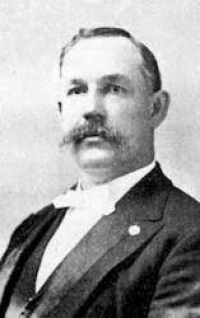
Edwin Othello Excell, commonly known as E. O. Excell, was a prominent American publisher, composer, song leader, and singer of music for church, Sunday school, and evangelistic meetings during the late nineteenth and early twentieth centuries
Federico García Lorca
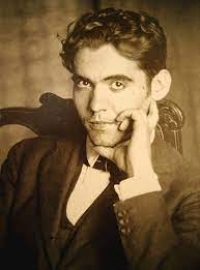
Federico del Sagrado Corazón de Jesús García Lorca (Spanish pronunciation: ; 5 June 1898 – 19 August 1936), known as Federico García Lorca (English: /ɡɑːrˌsiːə ˈlɔːrkə/ gar-SEE-ə LOR-kə), was a Spanish poet, playwright, and theatre director.García Lorca achieved international recognition as an emblematic member of the Generation of '27, a group consisting of mostly poets who introduced the tenets of European movements (such as symbolism, futurism, and surrealism) into Spanish literature. He was killed by Nationalist forces at the beginning of the Spanish Civil War. His remains have never been found.
Music theory

Music theory is the study of the practices and possibilities of music. The Oxford Companion to Music describes three interrelated uses of the term "music theory"
Asatte No Houkou

Living for the Day After Tomorrow (あさっての方向. Asatte no Hōkō?) is a Japanese manga series written and illustrated by J-ta Yamada. The manga was serialized in Mag Garden's magazine Comic Blade Masamune between March 3, 2005 and June 15, 2007; five bound volumes were released in Japan. The manga was adapted into an anime series produced by J.C.Staff, which aired in Japan between October and December 2006. The story is about a young girl who grows older into an adult, and an adult woman who becomes younger, turning into a child. The anime is licensed by Sentai Filmworks, and a complete series boxset will be distributed by Section23 Films on DVD on April 13, 2010.
Mariah Carey

Mariah Carey (born March 27, 1970) is an American singer, songwriter, record producer, and actress. She made her recording debut in 1990 under the guidance of Columbia Records executive Tommy Mottola, and became the first recording artist to have her first five singles top the U.S. Billboard Hot 100 chart. Following her marriage to Mottola in 1993, a series of hit records established her position as Columbia's highest-selling act. According to Billboard magazine, she was the most successful artist of the 1990s in the United States.
Following her separation from Mottola in 1997, Carey introduced elements of hip hop into her album work, to much initial success, but her popularity was in decline when she left Columbia in 2001, and she was dropped by Virgin Records the following year after a highly publicized physical and emotional breakdown, as well as the poor reception given to Glitter, her film and soundtrack project. In 2002, Carey signed with Island Records, and after a relatively unsuccessful period, she returned to pop music in 2005.
Carey was named the best-selling female pop artist of the millennium at the 2000 World Music Awards. She has had the most number-one singles for a solo artist in the United States (eighteen; second artist overall behind The Beatles), where, according to the Recording Industry Association of America, she is the third best-selling female and sixteenth overall recording artist. In addition to her commercial accomplishments, Carey has earned five Grammy Awards, and is well-known for her vocal range, power, melismatic style, and use of the whistle register.
Following her separation from Mottola in 1997, Carey introduced elements of hip hop into her album work, to much initial success, but her popularity was in decline when she left Columbia in 2001, and she was dropped by Virgin Records the following year after a highly publicized physical and emotional breakdown, as well as the poor reception given to Glitter, her film and soundtrack project. In 2002, Carey signed with Island Records, and after a relatively unsuccessful period, she returned to pop music in 2005.
Carey was named the best-selling female pop artist of the millennium at the 2000 World Music Awards. She has had the most number-one singles for a solo artist in the United States (eighteen; second artist overall behind The Beatles), where, according to the Recording Industry Association of America, she is the third best-selling female and sixteenth overall recording artist. In addition to her commercial accomplishments, Carey has earned five Grammy Awards, and is well-known for her vocal range, power, melismatic style, and use of the whistle register.
Sister Act
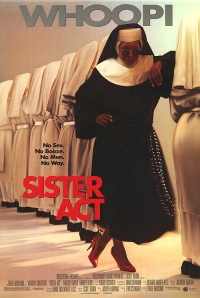
Sister Act is a 1992 American comedy film released by Touchstone Pictures. Directed by Emile Ardolino, it features musical arrangements by Marc Shaiman and stars Whoopi Goldberg as a Reno lounge singer who has been put under protective custody in a San Francisco convent and has to pretend to be a nun when a mob boss puts her on his hit list. Also in the cast are Maggie Smith, Kathy Najimy, Wendy Makkena, Mary Wickes, and Harvey Keitel. The film is #83 on Bravo's The 100 Funniest Movies list.
The film was followed by a 1993 sequel, Sister Act 2: Back in the Habit. It also inspired a musical stage version that premiered at the Pasadena Playhouse in Pasadena, California in 2006.
The film was followed by a 1993 sequel, Sister Act 2: Back in the Habit. It also inspired a musical stage version that premiered at the Pasadena Playhouse in Pasadena, California in 2006.
Astor Piazzolla

Ástor Pantaleón Piazzolla (March 11, 1921 – July 4, 1992) was an Argentine tango composer and bandoneón player. His oeuvre revolutionized the traditional tango into a new style termed nuevo tango, incorporating elements from jazz and classical music. An excellent bandoneonist, he regularly performed his own compositions with different ensembles.
Piazzolla's nuevo tango was distinct from the traditional tango in its incorporation of elements of jazz, its use of extended harmonies and dissonance, its use of counterpoint, and its ventures into extended compositional forms. As Argentine psychoanalyst Carlos Kuri has pointed out, Piazzolla's fusion of tango with this wide range of other recognizable Western musical elements was so successful that it produced a new individual style transcending these influences. It is precisely this success, and individuality, that makes it hard to pin down where particular influences reside in his compositions, but some aspects are clear. The use of the passacaglia technique of a circulating bass line and harmonic sequence, invented and much used in 17th and 18th century baroque music but also central to the idea of jazz "changes", predominates in most of Piazzolla's mature compositions. Another clear reference to the baroque is the often complex and virtuosic counterpoint that sometimes follows strict fugal behavior but more often simply allows each performer in the group to assert his voice. A further technique that emphasises this sense of democracy and freedom among the musicians is improvisation that is borrowed from jazz in concept, but in practice involves a different vocabulary of scales and rhythms that stay within the parameters of the established tango sound-world. Pablo Ziegler has been particularly responsible for developing this aspect of the style both within Piazzolla's groups and since the composer's death.
Piazzolla's nuevo tango was distinct from the traditional tango in its incorporation of elements of jazz, its use of extended harmonies and dissonance, its use of counterpoint, and its ventures into extended compositional forms. As Argentine psychoanalyst Carlos Kuri has pointed out, Piazzolla's fusion of tango with this wide range of other recognizable Western musical elements was so successful that it produced a new individual style transcending these influences. It is precisely this success, and individuality, that makes it hard to pin down where particular influences reside in his compositions, but some aspects are clear. The use of the passacaglia technique of a circulating bass line and harmonic sequence, invented and much used in 17th and 18th century baroque music but also central to the idea of jazz "changes", predominates in most of Piazzolla's mature compositions. Another clear reference to the baroque is the often complex and virtuosic counterpoint that sometimes follows strict fugal behavior but more often simply allows each performer in the group to assert his voice. A further technique that emphasises this sense of democracy and freedom among the musicians is improvisation that is borrowed from jazz in concept, but in practice involves a different vocabulary of scales and rhythms that stay within the parameters of the established tango sound-world. Pablo Ziegler has been particularly responsible for developing this aspect of the style both within Piazzolla's groups and since the composer's death.
Josh Groban
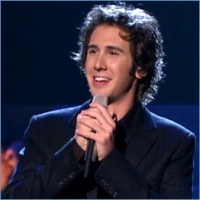
Joshua Winslow Groban (born February 27, 1981) is a Grammy-nominated American singer-songwriter. He has concentrated his career so far mostly in concert singing and recordings, although he has stated that he wishes to pursue musical theater in the future.
Various music critics have described Groban's voice in different ways, with some referring to him as a tenor and others as a baritone. In performance, Groban's music goes as low as G2 (as in the song "To Where You Are") and extends up to at least B4 flat or the B flat above middle C (as heard in "You Raise Me Up"). He also hits a High B during the Baywatch theme song in his Emmy performance of TV Theme Songs on September 21, 2008.This places his voice lower than the tenor range on the low end, and just short of Tenor C, and therefore above the baritone range, on the high end.
Some of Groban's musical influences have been Radiohead, Paul Simon, Sting, Peter Gabriel, and Björk. He says he is able to look up to anyone, musically, who has pushed the boundaries and stepped outside of the box. As for vocal influences, "anyone who told a story with their songs," including Mandy Patinkin, Klaus Nomi, George Hearn, and Luciano Pavarotti.
Various music critics have described Groban's voice in different ways, with some referring to him as a tenor and others as a baritone. In performance, Groban's music goes as low as G2 (as in the song "To Where You Are") and extends up to at least B4 flat or the B flat above middle C (as heard in "You Raise Me Up"). He also hits a High B during the Baywatch theme song in his Emmy performance of TV Theme Songs on September 21, 2008.This places his voice lower than the tenor range on the low end, and just short of Tenor C, and therefore above the baritone range, on the high end.
Some of Groban's musical influences have been Radiohead, Paul Simon, Sting, Peter Gabriel, and Björk. He says he is able to look up to anyone, musically, who has pushed the boundaries and stepped outside of the box. As for vocal influences, "anyone who told a story with their songs," including Mandy Patinkin, Klaus Nomi, George Hearn, and Luciano Pavarotti.
David Nevue
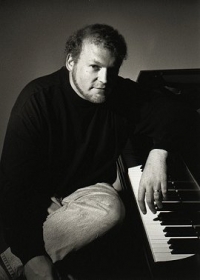
David Nevue is a solo piano composer and a pianist. He is the founder of Whisperings: Solo Piano Radio, an online radio station, as well as The Music Biz Academy, an educational web site for independent musicians. He is the author of the book, How to Promote Your Music Successfully on the Internet.
 Sheet Music 365 is a site for those who wants to access popular sheet music easily,
letting them download the sheet music for free for trial purposes.
It's completely free to download and try the listed sheet music, but you have to delete the files after 24 hours of trial.
Don't forget, if you like the piece of music you have just learned playing,
treat the artist with respect, and go buy the original sheet music.
Sheet Music 365 is a site for those who wants to access popular sheet music easily,
letting them download the sheet music for free for trial purposes.
It's completely free to download and try the listed sheet music, but you have to delete the files after 24 hours of trial.
Don't forget, if you like the piece of music you have just learned playing,
treat the artist with respect, and go buy the original sheet music.